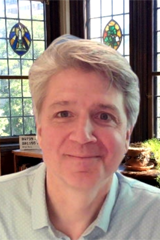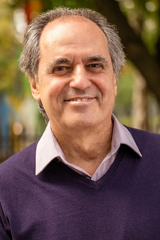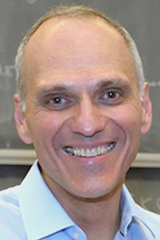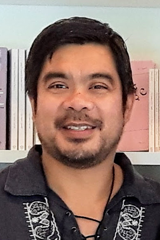On this page:
Fabien Gélinas
Franco Carnevale| Niky Kamran | Erik Kuhonta
Winner
 Fabien Gélinas, Law
Fabien Gélinas, Law
“The core of my philosophy is informed by the realization that in order to succeed and flourish, graduate students require a combination of factors that is unique to them.”
Biography
I have been involved in graduate teaching and supervision at McGill for 20 years. Today, as Sir William C. Macdonald Professor of Law, head of the Private Justice and the Rule of Law Research Group and co-founder of the Montreal Cyberjustice Laboratory, I continue to cherish above all the extraordinarily enriching mentoring relationships I have the privilege to develop with graduate and postdoctoral students. The wonderful people I have supervised over the years are spread out on all continents, in academia, legal practice, industry, government and international organisations. They are all family to me.
Approach to graduate supervision
The supervisory relationship is unique and of the highest importance. Communication about the expectations of the student as well as those of the supervisor, the institution and the discipline, must in my view remain open and fluid at all times. I see this as a central tenet of good supervision. The core of my approach, however, is informed by the realization, over the years, that in order to succeed and flourish, graduate students require a combination of factors that is unique to each of them. Some need more community integration, others more individual time; some thrive in a busy schedule of various tasks, while others are at their best with a more rigorous organization of time leaving long periods of research focus. This has an impact on the constructive determination and adaptation through time of each student’s winning combination of factors.
Testimonials
Prof. Gélinas a profondément marqué, tant sur le plan humain qu’intellectuel, mon parcours à l’Université McGill. À vrai dire, sans son appui je n’aurais jamais pu entreprendre des études supérieures. En tant que superviseur, son écoute attentive et son soutien indéfectible constituent des atouts indispensables. Sa générosité et son empathie font de lui un directeur attentif et bienveillant. He leads by example and never says no to commenting on a draft he has already read countless times. I couldn’t be happier to hear that our community is recognizing him for his outstanding work as supervisor. May many more students have the chance of being taken under his wing!
Dr. Giacomo Marchisio, Chargé de cours, Faculté de droit de l’Université McGill
When one looks for a supervisor, one looks for qualityin terms of expertise, integrity, availability, rigorous feedbackandprogress-tracking. I foundall these qualities in Professor Gélinas, and much more. Heis an outstanding mentor onall levels: academic, professional and personal. Over the years, I was pleasantly surprisedto discover the human being behind the teacher and mentor. Our relationship is based upon mutual trust and respect. ProfessorGélinas has helped me realize and prioritize what’s most important, even beyond my studies. Hisprecious advice has guided me during my graduate studies and will continue to guide me throughoutmy career and lifetime
Alexandra Pasca, DCL Candidate, Faculty of Law, McGill University
Nominees
 Franco Carnevale, Ingram School of Nursing
Franco Carnevale, Ingram School of Nursing
“I regard each graduate student as a moral agent aspiring to do good–whether through service, administration, research, education, and/or advocacy.”
Biography
Franco A. Carnevale is a nurse, psychologist and clinical ethicist. He is principal investigator for the VOICE Childhood Ethics research program. McGill academic appointments include: Full Professor, Ingram School of Nursing; Associate Member, Faculty of Medicine (Pediatrics); Adjunct Professor, Counselling Psychology; Affiliate Member, Biomedical Ethics Unit. Clinical appointments include: Clinical Ethicist for Child, Adolescent, and Family Services at Douglas Mental Health University Institute; Chair of the Clinical Ethics Committee at Shriner's Hospitals for Children (Canada); Clinical Ethics Consultant at The Lighthouse, Children and Families; and Associate Member of Pediatric Critical Care and Nursing Advisor at Montreal Children's Hospital.
Approach to graduate supervision
In my efforts to actualize my vision for my approach with graduate students: (a) I have and continue to invest heavily in my own continuous learning to help ensure my own expertise is always at “the cutting edge” (i.e., clinical as well as pedagogical expertise); (b) I try lead by example, demonstrating to trainees how I strive to embody leadership in research, service and education –always showing how these realms are reciprocally informing; and (c) I adapt my ethical commitment to “respect for persons” in my clinical work to my regard for graduate students as persons as well, who are also worthy of respect. My advanced ethics preparation helps inform my vision for the latter by regarding each graduate student as a moral agent aspiring to do good –whether through service, administration, research, education, and/or advocacy –striving to mobilize their existing strengths while turning to graduate education to further develop their capacities to act.
Testimonials
When I began my graduate studies in the Fall of 2017, Dr. Carnevale inspired a deep and lasting interest in the value and importance of nursing ethics, philosophy and, in particular, the impacts of qualitative healthresearch. I was fortunate to be guided by his expertise and inspired by his passion in these areas in two courses during my first year in the PhD program, both of which ultimately transformedthe direction of my current doctoral study. Having collectivelyendured living through a global pandemic over the past several months, we have seen first-hand the critical role that nurses play in all aspects of our health system, both as frontline care workers and researchers. It is because of dedicated and passionate professorsin nursing academia like Dr. Carnevale that we can be assured that future generations of nurses and health researcherswill continue to transform our health system. Given Dr. Carnevale’s relational teaching philosophy, his unwavering commitment to supporting his students and above all, inspiring of excellence in our discipline, I am confident that he will continue to excel as a supervisor and teacher.
Jacqueline van Wijlen (MN(NP), RN), PhD Student, Ingram School of Nursing, McGill University
It is difficult to overestimate the tremendous impact that Dr. Carnevale has had on me as a nurse, as a scholar and as an ethicist. He is steadfast in support and encouragement of his students. Dr. Carnevale has pushed me to pursue excellence, celebrated my accomplishments, and never diminishedme when I went down the wrong path or made a mistake. I have never had a conversation with Dr. Carnevale that didn’t end with a new idea, insight, or question I was keen to explore.I can recall several instances where I brought an idea to Dr. Carnevale; he would say “Cool!” before making a few suggestions and sending me off to explore. By giving me both support and freedom, I was challenged to develop my academic skills, knowing he was never far away. As my ideas solidified and my research proposal took shape, his questions became more focused, always concentrating on my global visionof my work, and, unbeknownst to me, preparing me for the next steps.
Marianne Sofronas, PhD Candidate, Ingram School of Nursing, McGill University
 Niky Kamran, Mathematics and Statistics
Niky Kamran, Mathematics and Statistics
“I find that the most delicate part of the process is to help students realize that progress in research is not linear.”
Biography
I was born and raised in Belgium, and obtained the equivalent of a Master's degree mathematics at the Universite Libre de Bruxelles, followed by a Ph.D. at the University of Waterloo. I have been a faculty member at McGill since 1989. My research interests are in the areas of differential geometry, geometric analysis and mathematical physics.
Approach to graduate supervision
My main goal as a thesis supervisor is to help the graduate students I am working with acquire the skills, knowledge and confidence needed to become successful independent researchers. Creating an inclusive atmosphere in which the students feel that their concerns are listened to, that they are understood and that they are fully supported in their moments of doubt is thus an essential component of my approach to graduate supervision. I find that the most delicate part of the process is to help students realize that progress in research is not linear and that setbacks and difficulties are part of every researcher’s experience. It is thus very important for me to help the students I am working with develop a broad vision of mathematics and the sense needed to identify questions which are both exciting and within reach, thus gradually building their own research program.
Testimonials
There is little doubt that this atmosphere of inclusion and respect was a result of Professor Kamran’s radiant and positive personality. He was always exceptionally kind and concerned with the well-being of his students. He was very generous with his time: I remember meeting with him in his office to discuss not only mathematics related to the course, but also my own research problems. Professor Kamran was kind enough on these occasions to share valuable mathematical and career advice with me, advice that to this day in my career remains relevant.
David Lilienfeldt, Postdoctoral Fellow, Einstein Institute of Mathematics of the Hebrew University of Jerusalem
When I visited McGill in Spring 2006 to tour the campus as a prospective MSc student in Mathematics, I was greeted by a colleague of Niky’s who asked me who my intended supervisor might be. When I mentioned Prof. Kamran, his face lit up and he remarked, “You can find yourself in no better situation.” In the past 15 years, I have never once doubted that statement. Now that I am a faculty member in Mathematics at the University of Saskatchewan, I model my own philosophy regarding graduate supervision and teaching on the example set by Niky. How I meet with students, how I run my graduate courses, and how I advise students even after they have graduated from Saskatchewan are all inspired by how Niky encouraged and mentored me. Moreover, this is my third year serving as the Chair of Graduate Studies in Mathematics & Statistics, a position I have approached by trying to implement Niky’s care and compassion for graduate students across our whole Department.
Dr. Steven Rayan, Associate Professor and Graduate Chair, Mathematics & Statistics, University of Saskatchewan
 Erik Kuhonta, Political Science
Erik Kuhonta, Political Science
“Students should discover, through their own passions, the topic they wish to investigate.”
Biography
I am the Director of the Institute for the Study of International Development and Associate Professor in the Department of Political Science at McGill University. Born in Kandy, Sri Lanka, I grew up in Rome, Italy, and am originally from the Philippines. My research focuses broadly on comparative political development in Southeast Asia. I am author of The Institutional Imperative: The Politics of Equitable Development in Southeast Asia (Stanford University Press, 2011), which was short-listed for the Canadian Political Science Association Prize in Comparative Politics. I have co-edited Party System Institutionalization in Asia: Democracies, Autocracies, and the Shadow of the Past (Cambridge University Press, 2015) and Southeast Asia in Political Science: Theory, Region, and Qualitative Analysis (Stanford University Press, 2008). My articles have appeared in Comparative Political Studies, Pacific Affairs, Contemporary Southeast Asia, Asian Survey, and Pacific Review. I received my Ph.D. from Princeton University, and my B.A. Magna Cum Laude from the University of Pennsylvania.
Approach to graduate supervision
Supervision of my students is rooted in deep analytical training but extends to extensive professional mentoring. Students should discover, through their own passions, the topic they wish to investigate. But in terms of the analytical scaffolding, I take very seriously my role in helping the student to structure and deepen their project. A project must have a distinct question and puzzle, rooted in the literature. This is, in fact, a very challenging task and it is only through an iterative process that a student can put together a project that is original and compelling. Finding the right question and eventual argument depends on close attention to causal theory, concept formation, and comparative logic – all skills that I emphasize in my seminars and in my discussions with students.
Testimonials
Professor Kuhonta is the exemplar of a teacher, a supervisor, and a mentor. His teaching is infused with passion, and he fosters intellectual curiosity and analytical rigor in all his seminars. To me, he has been a consistent source of motivation and inspiration. Prof. Kuhonta’s careful supervision and professional advice has allowed me to engage in important theoretical questions, and conduct original empirical data collection in the field. Prof. Kuhonta is a supportive and dedicated mentor who, before and after my graduation, has always been available to guide me, discuss my academic and professional goals. I can safely say that my dream to pursue research and teaching ignited on the benches of his seminars, I was constantly inspired by his work, and more than anything by his dedicated teaching, supervising, and mentorship.Léa Gruyelle, Administrative Assistant, Internship Offices Network, McGill University
Not only did Professor Kuhonta’s teaching acumen and passion prove instrumental to my political-scientific flowering, more significant still was the role he played as my de factomentor, a mantle he willfully and generously assumed. I do not think that without his counsel and support I would have managed to sit where I now sit, at Cornell University. This is the most important and concrete achievement that Professor Kuhonta has helped me reach. I am most thankful for the degree of warmth, empathy, and confidence that he has shown me throughout these transitory times, without which I firmly believe I would most certainly neither be a political scientist nor half the person I now am.
Louis-Philippe Brochu, PhD Student, Cornell University
 This work is licensed under a
This work is licensed under a 